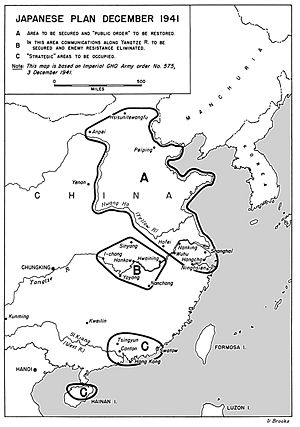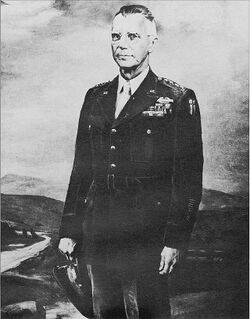Joseph Warren Stilwell: Difference between revisions
imported>Richard Jensen (map) |
imported>Richard Jensen (add details) |
||
| Line 1: | Line 1: | ||
[[Image:Stilwell.jpg|thumb|250px]] | [[Image:Stilwell.jpg|thumb|250px]] | ||
'''Joseph Warren Stilwell''' (1883 - 1946), was | '''Joseph Warren Stilwell''' (1883 - 1946), was a senior American general in [[World War II]] as commander of American forces in the China-Burma-India theater, commander of the main Chinese armies in Burma, (1942-44) with four-star rank, and, as commander in the late stages of the [[Okinawa, battle of|battle of Okinawa]] in 1945. He was scheduled to lead the invasion of Japan when the war suddenly ended. "Vinegar Joe" was notoriously difficult to work with, especially in a role in China that was primarily diplomatic. A fighting general who spoke Chinese and knew the villages well, he possessed a fierce integrity, and a hatred of incompetence and pretentiousness, but was sometimes devious and secretive. | ||
==Career== | ==Career== | ||
He was born in Palatka, Florida, where his wealthy parents were vacationing, and brought up in New York City. Both bookish and athletic, he was headed for Yale until his pranksterism caused his father to send him to West Point to be straightened out. Stilwell was graduated from West Point in 1904, and eagerly made a career in the Army. After service in the Philippines he was an intelligence officer (G-2) in the [[American Expeditionary Forces]] in France during World War I. | |||
==World War II== | ==World War II== | ||
[[Image:Cbi-1941.jpg|thumb|300px|Japan's plans to control key areas of China, 1941; Japan already held Manchuria as the puppet state of [[Manchukuo]]]] | [[Image:Cbi-1941.jpg|thumb|300px|Japan's plans to control key areas of China, 1941; Japan already held Manchuria as the puppet state of [[Manchukuo]]]] | ||
Revision as of 18:20, 20 June 2008
Joseph Warren Stilwell (1883 - 1946), was a senior American general in World War II as commander of American forces in the China-Burma-India theater, commander of the main Chinese armies in Burma, (1942-44) with four-star rank, and, as commander in the late stages of the battle of Okinawa in 1945. He was scheduled to lead the invasion of Japan when the war suddenly ended. "Vinegar Joe" was notoriously difficult to work with, especially in a role in China that was primarily diplomatic. A fighting general who spoke Chinese and knew the villages well, he possessed a fierce integrity, and a hatred of incompetence and pretentiousness, but was sometimes devious and secretive.
Career
He was born in Palatka, Florida, where his wealthy parents were vacationing, and brought up in New York City. Both bookish and athletic, he was headed for Yale until his pranksterism caused his father to send him to West Point to be straightened out. Stilwell was graduated from West Point in 1904, and eagerly made a career in the Army. After service in the Philippines he was an intelligence officer (G-2) in the American Expeditionary Forces in France during World War I.
World War II

Bibliography
- Liang, Chin-Tun. Gen. Stilwell in China, 1942-1944 (1972), a pro-Chiang view
- Romanus, Charles F. and Riley Sunderland. Stilwell's Mission to China (1953), official U.S, Army history online edition
- Romanus, Charles F. and Riley Sunderland. Stilwell's Command Problems (1956) online edition
- Schaller Michael. The U.S. Crusade in China, 1938-1945. (1979).
- Tuchman, Barbara. Stilwell and the American Experience in China, 1911-45, (1972), 624pp; Pulitzer prize excerpt and text search
Primary Sources
- Stilwell, Joseph Warren. The Stilwell papers edited by Theodore H. White, (1958).
